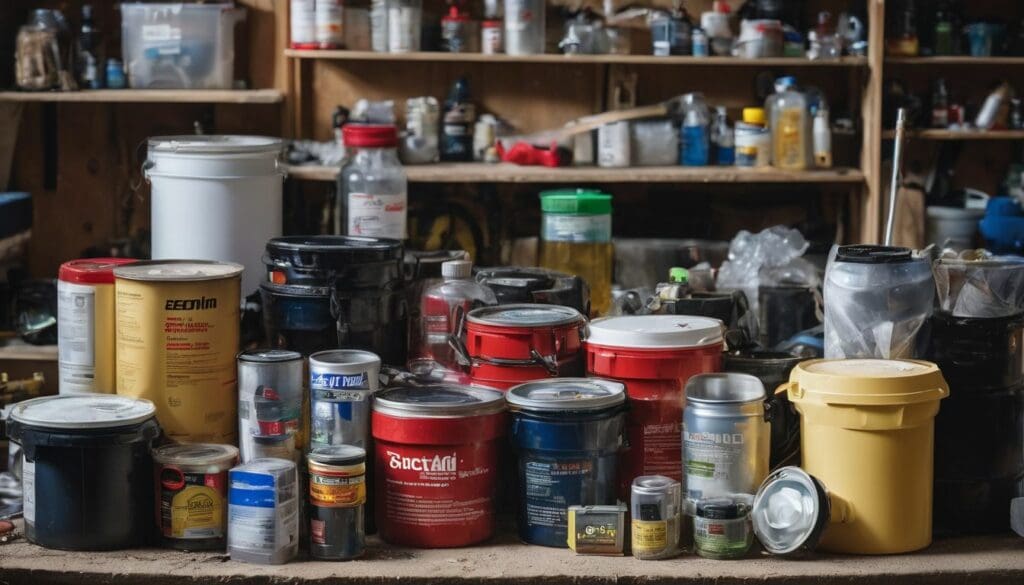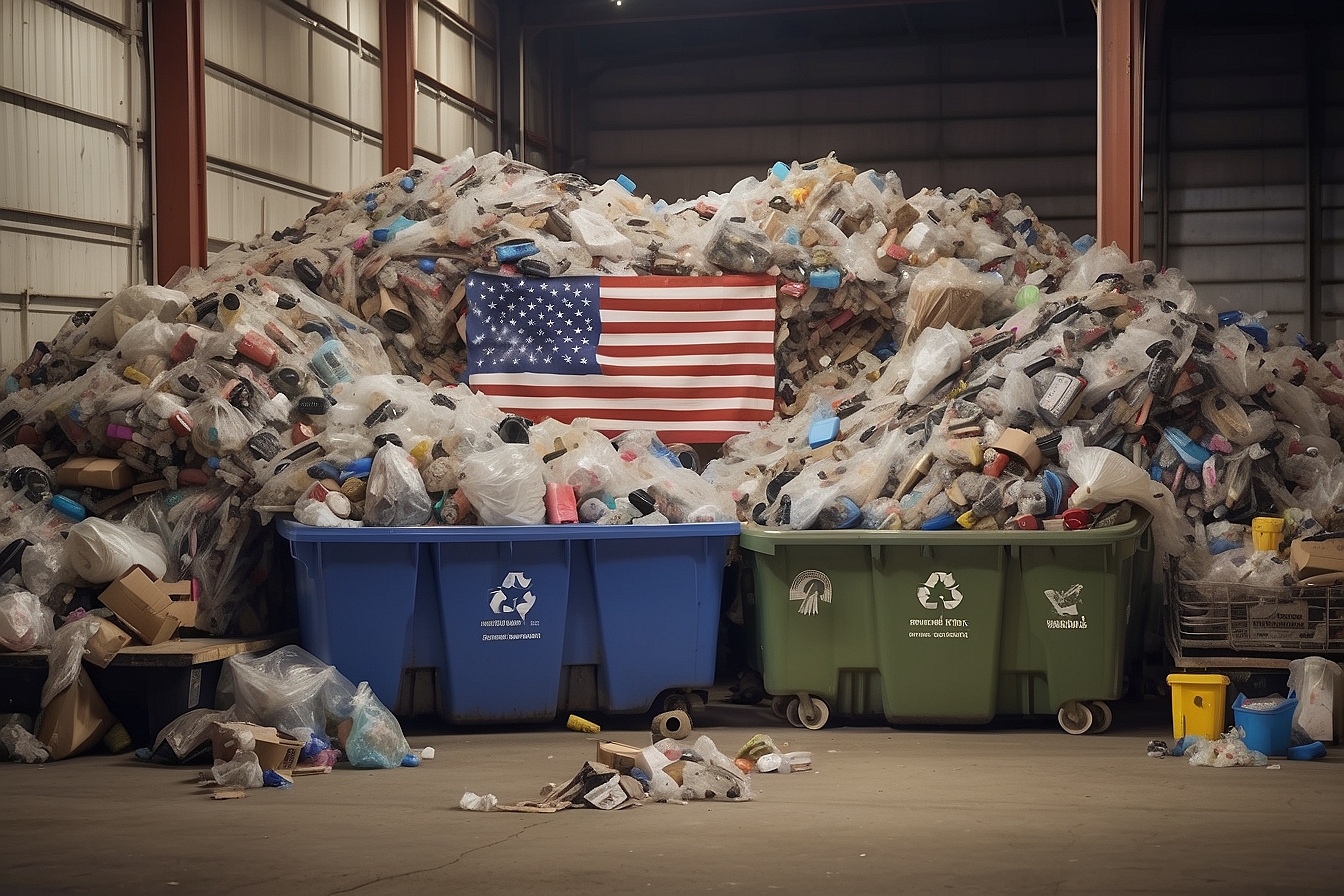Ever peered into your cupboard to be greeted by an overwhelming array of cleaning agents and pondered the correct method for their disposal? We fully empathise. It’s quite startling to grasp that a typical household may accumulate upwards of 100 pounds in hazardous waste.
Through diligent exploration, we’ve unearthed practical strategies for navigating the precarious landscape of these substances. Continue reading as we share our insights on the prudent management and disposal of household hazardous waste – it’s far easier than you might anticipate!
Key Takeaways
- Household hazardous wastes like paints, cleaners, and batteries can harm the environment and health if not dealt with correctly.
- Store these items in their original containers and keep them out of reach from children and pets to prevent accidents.
- Use local recycling centres, collection events or pick-up services for safe disposal of hazardous waste.
- Keep an eye on community events for special drop – off days organised for getting rid of such dangerous substances responsibly.
- Donation is a good option for unwanted items, as many organisations welcome old paint or cleaning products.
Understanding Household Hazardous Waste
Household hazardous waste refers to any discarded household products that contain substances that can be harmful to human health or the environment if not disposed of properly. Examples include batteries, pesticides, and cleaning products.
It’s important to understand the potential hazards and risks associated with these materials in order to handle and dispose of them safely.
Definition and examples
Household hazardous waste includes any discarded items or materials that may harm public health, safety, and the environment. Think of things like paints, cleaners, oils, batteries, and pesticides.
These products contain toxic substances such as mercury, lead, and acids which require special care during disposal to prevent environmental pollution.
Many of us have these items under our kitchen sinks or in our garages. Fluorescent lightbulbs save energy but they can’t go out with the regular rubbish due to their mercury content.
Motor oil keeps our cars running smoothly yet becomes a pollutant if it soaks into the ground or enters waterways. We come across hazardous waste more often than we might think; recognising them plays a crucial role in responsible household chemical disposal and environmental protection measures.
Potential hazards and risks
Household hazardous waste poses significant risks to both human health and the environment. Improper handling or disposal of these materials can lead to contamination of soil, water sources, and air quality.
Exposure to hazardous chemicals from household waste can result in acute or chronic health issues such as respiratory problems, skin irritation, and even serious illnesses like cancer.
Furthermore, improper disposal methods can potentially harm wildlife and ecosystems, disrupting natural habitats and contributing to pollution.
The potential hazards associated with household hazardous waste demand proactive measures for safe management and proper disposal. It is crucial for environmentally conscious individuals to fully understand the risks involved in mishandling these materials.
By adopting responsible practices when dealing with household hazardous waste, we can protect not only ourselves but also our communities and the planet as a whole.
Safe Handling and Disposal of Household Hazardous Waste
When it comes to safely handling and disposing of household hazardous waste, proper storage is crucial. From keeping chemicals in their original containers to securing them away from children and pets, it’s important to take the necessary precautions.
Additionally, understanding the different disposal methods available and knowing where to find local resources for safe disposal can help minimise environmental impact.
Proper storage
Proper storage of household hazardous waste is essential for environmental safety and pollution prevention. Here are some guidelines to ensure safe and secure storage:
- Keep hazardous products in their original containers to avoid confusion.
- Store items in a cool, dry place away from direct sunlight and heat sources.
- Keep hazardous materials out of reach of children and pets by securing cabinets or using locks.
- Always store incompatible materials separately to prevent chemical reactions.
- Label all containers with the contents and the date they were first stored.
- Regularly check for leaks or damage to containers, and replace them if necessary.
Disposal methods
Household hazardous waste can be disposed of safely using specific methods. Here are some effective disposal methods for managing household hazardous waste:
- Chemical Recycling Centres: Many local authorities run specialised recycling centres that accept and safely dispose of household hazardous waste.
- Hazardous Waste Collection Events: Look out for organised collection events in your community where you can drop off items such as paint, batteries, and cleaning products.
- Hazardous Waste Pick-Up Services: Some areas offer pick-up services for hazardous waste materials, including chemical products and electronics.
- Household Hazardous Waste Disposal Facilities: Find dedicated facilities that handle the safe disposal of items such as pesticides, solvents, and other harmful chemicals.
- Donate Unwanted Items: Consider donating usable but unwanted items like old paint or unused cleaning agents to community groups or charity organisations.
Resources for disposal locations
When disposing of household hazardous waste, it is important to know the proper locations where you can safely and responsibly dispose of these materials. Here are some useful resources to help you find disposal locations for your household hazardous waste:
- Local Household Hazardous Waste Collection Facilities: Many local authorities have designated collection facilities where you can drop off your household hazardous waste for safe disposal.
- Recycling Centres: Some recycling centres accept certain types of household hazardous waste, such as batteries, electronics, and fluorescent light bulbs.
- Hazardous Waste Events: Keep an eye out for community events or drop-off days specifically organised for the collection of household hazardous waste. These events are often held by local governments or environmental organisations.
- Online Databases: There are various online databases and tools that allow you to search for nearby disposal locations based on the type of hazardous waste you need to dispose of.
- Retailers and Manufacturers: Some retail stores and manufacturers provide take-back programmes for specific items like paint, batteries, and electronics, making it easier for consumers to responsibly dispose of these products.
- Municipal Waste Collection Services: Check if your local municipal waste collection service offers special pick-up or disposal options for household hazardous waste items that cannot be thrown in the regular rubbish.
- Hazardous Waste Hotlines: Some regions have dedicated hotlines or websites where you can obtain information about proper disposal methods and locations for different types of household hazardous waste.
Conclusion
In conclusion, handling and disposing of household hazardous waste is crucial for protecting the environment. Following proper storage guidelines reduces the risk of exposure to harmful chemicals.
Responsible disposal methods safeguard our communities and natural resources. Recycling household hazardous waste supports sustainable practices and a cleaner future for all.
FAQs
1. What is household hazardous waste?
Household hazardous waste includes common items like cleaning chemicals and batteries that can harm the environment if not disposed of properly.
2. How should I handle hazardous materials from my home?
You must follow proper waste handling guidelines, such as keeping materials in their original containers and storing them away from children.
3. Can I recycle any household hazardous wastes?
Yes, certain types of household waste can be recycled through special programmes designed for safe disposal and to avoid environmental damage.
4. Why is it important to dispose of household chemicals correctly?
Proper disposal ensures that dangerous substances are managed without risking human health or causing pollution, which is why observing hazardous waste regulations is essential.
5. Who can help me with the disposal of my home’s hazardous wastes?
Local councils provide waste management services, including specific guidance on how to manage various types of household wastes according to safety standards.





